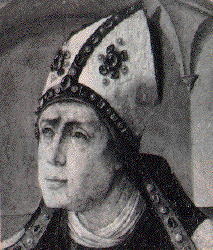Augustin, Luther, Calvin



The men who, next to the Apostles, have exerted and still exert through their writings the greatest influence in the Christian Church, as leaders of theological thought, are St. Augustin, Martin Luther, and John Calvin: all pupils of Paul, inspired by his doctrines of sin and grace, filled with the idea that God alone is great, equally eminent for purity of character, abundance in labors, and whole-souled consecration to the service of Christ, their common Lord and Saviour; and yet as different from each other as an African, a German, and a Frenchman can be. Next to them I would place an Englishman, John Wesley, who, as to abundance of useful labor in winning souls to Christ, is the most apostolic man that Great Britain has produced.
Augustin commands the respect and gratitude of the Catholic as well as the Protestant world. He is, among the three the profoundest in thought, and the sweetest in spirit; free from bitterness and coarseness, even in his severest polemics; yet advocating a system of exclusiveness which justifies coercion and persecution of heretics and schismatics. He identified the visible catholic church of his day with the kingdom of God on earth, and furnished the program of mediaeval Catholicism, though he has little to say about the papacy, and protested, in the Pelagian controversy, against the position of one Pope, while he accepted the decision of another. All three were fighters, but against different foes and with different weapons. Augustin contended for the catholic church against heretical sects, and for authority against false freedom; Luther and Calvin fought for evangelical dissent from the overwhelming power of Rome, and for rational freedom against tyrannical authority. Luther was the fiercest and roughest fighter of the three; but he alone had the Teutonic gift of humor which is always associated with a kindly nature, and extracts the sting out of his irony and sarcasm. His bark was far worse than his bite. He advised to drown the Pope and his cardinals in the Tiber; and yet he would have helped to save their lives after the destruction of their office. He wrote a letter of comfort to Tetzel on his death-bed, and protested against the burning of heretics.
Luther and Calvin learned much from Augustin, and esteemed him higher than any human teacher since the Apostles; but they had a different mission, and assumed a polemic attitude towards the traditional church. Augustin struggled from the Manichaean heresy into catholic orthodoxy, from the freedom of error into the authority of truth; the Reformers came out of the corruptions and tyranny of the papacy into the freedom of the gospel. Augustin put the church above the Word, and established the principle of catholic tradition; the Reformers put the Word above the church, and secured a progressive understanding of the Scriptures by the right of free investigation.
Luther and Calvin are confined in their influence to Protestantism, and can never be appreciated by the Roman Church; yet, by the law of re-action, they forced the papacy into a moral reform, which enabled it to recover its strength, and to enter upon a new career of conquest. Romanism has far more vitality and strength in Protestant than in papal countries, and owes a great debt of gratitude to the Reformation.
Of the two Reformers, Luther is the more original, forcible, genial, and popular; Calvin, the more theological, logical, and systematic, besides being an organizer and disciplinarian. Luther controls the Protestant churches of Germany and Scandinavia; Calvin’s genius shaped the confessions and constitutions of the Reformed churches in Switzerland, France, Holland, and Great Britain; he had a marked influence upon the development of civil liberty, and is still the chief molder of theological opinion in the Presbyterian and Congregational churches of Scotland and North America. Luther inspires by his genius, and attracts by his personality; Calvin commands admiration by his intellect and the force of moral self-government, which is the secret of true freedom in church and state.
Great and enduring are the merits of the three; but neither Augustin, nor Luther, nor Calvin has spoken the last word in Christendom. The best is yet to come.
HISTORY OF THE CHRISTIAN CHURCH Schaff Volume 7 MODERN CHRISTIANITY THE GERMAN REFORMATION (Pages 736-738)

0 Comments:
Post a Comment
<< Home